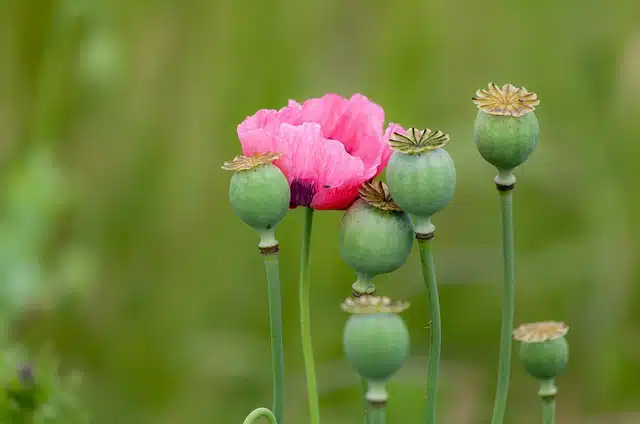
Opium is obtained from the poppy.
Opium is a word that derives from the Latin word opĭum and refers to a bitter substance with a powerful aroma that is used as a narcotic . Opium is obtained from the heads of green poppies : it is their dried juice.
Poppy (Papaver somniferum) es el nombre común por el cual se reconoce a una annual herbaceous plant similar a la common poppy. Puede alcanzar una altura máxima de un metro y medio y luce flores blancas, fucsias o violetas.
Opium extraction
To extract opium, the flowers are expected to fall and superficial cuts are made in the head of the plant , which exudes a whitish viscous substance. This liquid, when dried, transforms into a brownish resin with a sticky consistency that can be scraped from the poppy head to obtain pure opium.
Experts say that, if opium is allowed to dry more than necessary, it transforms into a solid stone of a darker color due to the loss of water and the concentration of its alkaloids : morphine, codeine, thebaine, narcotine and narceine, among others. others.

Opium can be smoked.
Effects of consumption
The ingestion of opium generates several effects on the human body. First, drowsiness is experienced that continues with itching and tingling and may continue with hallucinations , nausea and vomiting.
Opium can be smoked, ingested orally, or drunk as an infusion. The process for smoking opium involves diluting the substance in water and heating it over low heat, then filtering it and heating it again until the water evaporates. It should be noted that, due to its harmful effects on the body, the marketing and possession of opium is prohibited in most countries.
In some South American countries, the term opium is used to name something very boring : “This game is an opium: let's change the channel and watch something else.”
The Opium War
The Opium War was a conflict that broke out during the years 1839 and 1842 between China and Great Britain, whose origin was related to the beginning of the commercialization of opium in China ; It was sold by the British government that then dominated the East Indies, where it was grown.
For the British, the sale of opium meant an important source of income, through which they could offset the immense expense that importing tea from China entailed for them . However, the Chinese government did not agree with this commercialization and prohibited the sale and consumption of this narcotic in the territory.
Both the British government and representatives of Indian trade sent emissaries to China in order to reach an agreement to lift that ban, which implied an immense loss for them; However, they did not obtain favorable results.
Given the circumstances, the British government sent state-of-the-art war fleets that were easily defeated by the Chinese fleet, whose characteristics were quite poor. Everything concluded with the signing of the Treaty of Nanking , which the Chinese emperor could not oppose, after the defeat suffered. In it, the government was obliged to respect the laws of free trade between that country and England, including, among all products, opium. In addition, they ceded Hong Kong Island to the British government for 150 years .
It is worth mentioning that the consequences of this conflict were quite extensive. From the imposed signing of the treaty, other nations saw the space to pressure the Chinese Empire, forcing it to sign treaties of unequal characteristics , which undermined the sovereignty of this country over its own territory.
